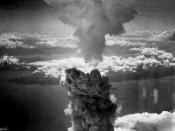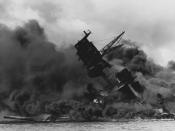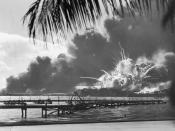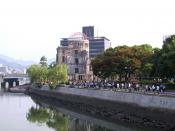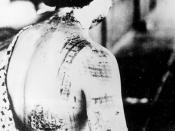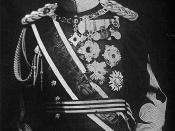A Cruel World The world can be a cruel place as most people know, and the harsh realities of life are forced on people everyday. However times are changing, countries are becoming wealthier and wealthier as each day goes by allowing for more enjoyment and prosperity and less misery and sorrow. It has been more than fifty years now since the last World War (WWII), and countries are getting along and cooperating with one another more than ever before. Nevertheless, since the world can be such a cruel place, all the peace and friendship can end in just the blink of an eye if an atom bomb is detonated somewhere. The atomic bomb can wipe out an entire city in a matter of seconds. Imagine closing your eyes for a couple seconds. Then all the sudden you hear while at the time feel a large explosion. Although your eyes were closed you could still see a very bright flash followed by complete darkness.
It is an almost unimaginable horror that thousands of innocent Japanese men, women, and children faced when the United States dropped the Atomic bombs on the cities of Hiroshima and Nagasaki. "August 6, 1945 the world dramatically entered the atomic age: without either warning or precedent, and American plane dropped a single nuclear bomb on the Japanese city of Hiroshima. The explosion destroyed more than four square miles of the city center. About 90,000 people were killed immediately; another 40,000 were injured, many of who died in protracted agony from radiation sickness. Three days later, a second atomic strike on the city of Nagasaki killed some 37,000 people and injured another 43,000. Together the two bombs eventually killed and estimated 200,000 Japanese civilians."ÃÂ (Weber 1). All those lives taken away and for what. President Truman said that it was done for the sake of ending the war quickly and saving thousands or possibly millions of American soldiers lives. Was dropping the atomic bombs on Japan necessary? The United States bombing of Hiroshima and Nagasaki was unnecessary for the following three reasons: first, Japan was already very weak and had been practically defeated, second, the Japanese government including emperor Hirohito were trying to bring the war to a quick peaceful end without losing more lives, lastly the bombings were done for revenge from the Japanese attack on Pearl Harbor. Those three reasons listed above show how the United States bombing of Hiroshima and Nagasaki was not only cruel, and evil but also unnecessary, simply satisfying the revenge that Americans sought for Pearl Harbor.
Japan was slowly being destroyed. The Japanese Navy and Air Force had been demolished with the rest of their military by June 1945(1). Yet, the bombs were dropped two months later. "President Truman, wrote, "By the beginning of September 1944, Japan was almost completely defeated through a practically complete sea and air blockade"ÃÂ. (William Leahy, I was There, PG 259) (Weber 2). Still the U.S. kept fighting on without any remorse toward the Japanese at all. By July of 1945 a quarter of the homes in Japan had been wiped out, Japans oil supply had been cut off, and remaining factories tried building weapons as quickly as possible before they were blown away (2). Japanese civilians were starving all this time, since food became so scarce, to stay alive they would stay on a sub starvation diet rationing out and conserving the little bit of food they had (2). Before " On the night of March 9-10, 1945, a wave of 300 American bombers struck Tokyo, killing 100,000 people. Dropping nearly 1,700 tons of bombs, the war planes ravaged much of the capital city completely burning out 16 square miles and destroying a quarter of a million structures. A million residents were left homeless"æ On May 23, eleven weeks later, comae the greatest air raid of the Pacific War, when 520 giant B-29 "Superfortress"àbombers unleashed 4,500 tons of incendiary bombs on the heart of the already battered Japanese capital. Generating gale-force winds, the exploding incendiaries obliterated Tokyo's commercial center and railway yard, and consumed the Ginza entertainment district. Two day later, on May 25, a second strike of 502 "Superfortress"àplanes roared low over Tokyo, raining down some 4,000 tons of explosives. Together these two B-29 raids destroyed 56 square miles of the Japanese capital (2). All this destruction and the U.S. still decided to drop those two atomic bombs on Japan in August only a couple months later. Japan was obviously hurt and hurt bad; they did not have a chance of winning anything and could only prevent the loss of more. " Japan would have surrendered even if the bombs had not been dropped, even if Russia had not entered the War and even if no invasion had been planned or contemplated."à(Takaki 34). Japan was defenseless looking for an opportunity to get out of this brutal war.
Japan was in ruins and wanted to end the war peacefully. " Months before the end of the war, Japans leaders recognized that defeat was inevitable. In April 1945 a new government headed by Kantaro Suzuki took office with the mission of ending the war."ÃÂ (Weber 3). The United States knew that Japan was willing to give up but continued pounding Japan to death. " American officials, having long since broken Japan's secret codes, knew from intercepted messages that the country's leaders were seeking to end the war on terms as favorable as possible. Details of these efforts were know from decoded secret communication between the Foreign Ministry in Tokyo and Japanese diplomats abroad (3)"ÃÂ. Japan was helpless and desperately trying to find a way out of the war. "By early July the US had intercepted messages from Togo to the Japanese ambassador in Moscow, Naotake Sato, showing that the Emperor himself was taking a personal hand in the peace effort, and had directed that the Soviet Union be asked to help end the war. US officials also knew that the essential obstacle to ending the war was American insistence on "unconditional surrender"ÃÂ, demand that precluded and negotiations. The Japanese were willing to accept nearly everything, except turning over their semi-divine Emperor. Heir of a 2,600-year-old dynasty, Hirohito was regarded by his people as a "living god"ÃÂ who personified the nation. (Until the August 15 radio broadcast of his surrender announcement, the Japanese people had never heard his voice.) Japanese particularly feared that the Americans would humiliate the Emperor, and even execute him as a war criminal."ÃÂ (4). How come the United States refused to give the unconditional surrender policy during the war, not allowing them to keep their emperor, but after the war deciding that they could indeed keep emperor Hirohito. There is no way to cover it up, Japan was pleading almost begging to get out of the war in their messages to the Japanese ambassador in Moscow, again only requesting that the emperor be unharmed. (4).
If the United States refused to give on the "unconditional surrender policy"àduring the war, but allowed them to keep emperor Hirohito anyway after the war was over what made the United States, want to keep fighting? Using the unconditional surrender just wanting safety for their emperor (4). Pearl Harbor is what kept the United States from easing on the "unconditional surrender policy"àand is what motivated the United States to drop the atomic bombs on Japan. "ÃÂAll the same, most Americans accepted, and continue to accept, the official justifications for the bombings. Accustomed to crude propagandistic portrayals of the "Japs"àas virtually subhuman beasts, most Americans in 1945 heartily welcomed any new weapon that would wipe out more of the detested Asians, and help avenge the Japanese attack on Pearl Harbor. For the young Americans who were fighting the Japanese in bitter combat, the attitude was "Thank God for the atom bomb"ÃÂ. Almost to a man, they were grateful for a weapon whose deployment seemed to end the war and thus allow them to return home."à(4+). Americans had been waiting four long years for revenge and were waiting for Trumans decision. "Truman may have felt bound by American Public opinion"æSince Pearl Harbor, Americans had sought revenge"ÃÂ. (Aron 162). Finally on August 9, Truman allowed the first atomic bomb to be dropped. "I regarded the bomb as a military weapon and never had any doubt that it should be used"ÃÂ. (Truman 327). The United States got the revenge it wanted and felt deserved for the bombing of Pearl Harbor and after hitting Japan with another atomic bomb three days later decided to end World War II.
Finally the war was over and American troops were going back to their families and loved ones. While at the same time, Japanese soldiers were going back to a land of ruins and to find that homes and families has been destroyed. All the destruction, the pain and suffering when the war could have ended earlier at least sparing the cities of Hiroshima and Nagasaki. All Japan wanted throughout the entire war was peace and rule by their emperor, Hirohito, and were willing to give under the "unconditional surrender policy"ÃÂ. Japan wanted to give up with any cost besides the emperor, they knew what was coming, and they could not stop it, like a bunch of sitting ducks. The bombing of Pearl Harbor caused Americans to deeply despise the Japanese and so they felt dropping the atomic bomb necessary for ending the war. It was not needed to end the war in any way what so ever, but was necessary to get back at Japan for Pearl Harbor. "Many found the revenge satisfying, regardless of the loss of additional American lives spent to achieve it."ÃÂ (Long 2).
